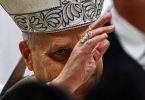
People stand in front of an altar in 2014 with food offerings during a protest for the 43 missing students of the Ayotzinapa teacher training college in Chilpancingo, Mexico. Pope Francis arrives in Mexico Feb. 12 for a visit in which he is expected to address issues of human rights and national tragedies such as the violence, which has claimed more than 100,000 lives and left an estimated 25,000 missing persons over the past 10 years. (CNS photo/Daniel Becerril, Reuters)
by David Agren
MEXICO CITY (CNS) — Maria Jesus Tlatempa Villa has searched tirelessly for her son, Jose Eduardo Bartolo Tlatempa, a student from the Ayotzinapa teacher training college.
She’s prayed, too, and, like the other parents of 43 students missing since September 2014, never believed the official government investigation, which said the students were attacked by police, then turned over to organized crime and killed. The government says the students’ bodies were burned in a garbage dump with the ashes tossed in a river.
Tlatempa and the other parents insist their children are still alive but have found few allies in their struggle. Tlatempa said she has found indifference from her local parish priest, who she says wants to charge fees for a monthly Mass on the day of the disappearance. The poor farming families cannot afford the fees, she said.
“The only thing that keeps us going is faith and hope,” she said Feb. 9 at the Jesuit-run Miguel Agustin Pro Juarez Human Rights Center in Mexico City, which has taken up the families’ cause. “The church has let us down.”
Pope Francis arrives in Mexico Feb. 12 for a visit in which he is expected to address issues of human rights and national tragedies such as the violence, which has claimed more than 100,000 lives and left an estimated 25,000 missing people over the past 10 years. He also is expected to meet with victims of violence collectively, according to the Mexican bishops’ conference, though details are still uncertain.
Groups representing victims of violence and other social causes have high hopes the pope will give voice to their struggles — even those traditionally at odds with the Catholic church and its teaching.
Human rights issues cause conflict in the Mexican church, according to some socially minded Catholics, though several dioceses — most notably Acapulco — have put helping victims at the center of their pastoral approaches. But the church often has spoken timidly on tough issues and pursued close relations with the political class, rather than speaking prophetically, they say.
“The Mexican Catholic Church is very conservative,” said Father Oscar Enriquez, director of the Paso del Norte Human Rights Center in Ciudad Juarez, once murder capital of the world and where Pope Francis visits Feb. 17. “The church has stayed on the sidelines of the biggest problems, the big social problems, and has also been close with the elites as much here as on the national level.”
Families of the 43 students from the Ayotzinapa school have petitioned church officials for an audience with Pope Francis for pastoral reasons, but also the hope that he can put pressure on Mexican officials.
The Mexican bishops’ conference has granted the parents of the students tickets to attend the pope’s Mass in Ciudad Juarez. Auxiliary Bishop Eugenio Lira Rugarcia of Puebla, conference secretary-general, told reporters Feb. 10 an audience with the pope was unlikely as the pope’s schedule was tight and many victims were seeking similar encounters.
“There are many persons who have suffered this tragedy, there are many collectives. The pope would have liked to receive everyone, but he cannot privilege one, single group,” Bishop Lira said.
Bishop Lira has denied any suggestions the church hierarchy has not spoken out on violence and previously has pointed a 2010 report on the issue.
Still, the church’s distant relationship with the parents in the Ayotzinapa case has caused controversy. Few cases have captured the crisis of human rights in Mexico quite like the attack on the 43 students — whose schools was at times unpopular for its — because the case showed organized crime had infiltrated politics and the police. Critics say the government response showed sloppiness and expedience, even though then-Attorney General Jesus Murillo Karam called it “the historic truth.”
Argentine forensic experts recently discarded the government’s assertion that criminals burned the students’ bodies in a garbage dump as implausible. None of the 19 human remains found in the Guerrero state garbage dump belonged to the students.
The case received similar scrutiny from a team of experts from the Inter-American Commission on Human Rights, who checked satellite photos and weather records and found no evidence of fire on the night in question and steady rains while an all-night inferno supposedly raged.
The Jesuit-run Centro Pro Juarez facilitated the presentation of those reports and offered legal advice to the families, then was attacked by pro-government publications. The organization also has had poor relations with the Archdiocese of Mexico City, whose leader, Cardinal Norberto Rivera Carrera, accused it of partnering in programs with groups promoting abortion. The center denies the charge.
Vidulfo Rosales, the families’ lawyer, said grass-roots Catholics have supported the parents’ cause.
Archbishop Christophe Pierre, papal nuncio, celebrated Mass at the Ayotzinapa school in December 2014, but Rosales said he became distant afterward.
“The entire Catholic hierarchy has made common cause with the government to discredit the parents’ struggle to brand them as a threat to the country’s institutions,” he told Catholic News Service.
“They haven’t walked with them, they haven’t shown solidarity with the parents, with victims — not only the parents of the 43, but with all the victims in the country.”






